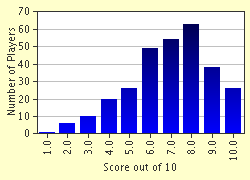Quiz Answer Key and Fun Facts
1. In which novel does Aldous Huxley depict a society in which universal happiness exists, but only through the use of the drug Soma?
2. Which author's "Harrison Bergeron" depicts a world where, as the opening line promises, "everybody was finally equal"?
3. Which Margaret Atwood dystopia features a main character named Offred?
4. Another discouraging view of the future was written in 1921 by Yevgeny Zamyatin. What rather short name does Zamyatin's novel have when translated into English?
5. William Nolan's "Logan's Run" depicts a society that finally found a solution to the problem of overpopulation. What is that solution?
6. "Anthem" depicts a collectivist future where even the use of the word "I" has dropped from the language. Which author wrote this dystopia?
7. A more recent example of the genre comes from Lois Lowry, who authored what Newberry Medal winning tale in 1993?
8. What author's 1966 novel "Make Room, Make Room!" envisioned a future where overcrowding has made life in New York City miserable?
9. In 1920 Karel Capek wrote a dystopian play often abbreviated "R.U.R". That play became famous not so much for its literary content as for its introduction of which word into the English language?
10. "It Can't Happen Here" is a story about the rise of Fascism in the United States written by what author of "Arrowsmith" and "Main Street"?
Source: Author
kevinatilusa
This quiz was reviewed by FunTrivia editor
MotherGoose before going online.
Any errors found in FunTrivia content are routinely corrected through our feedback system.


